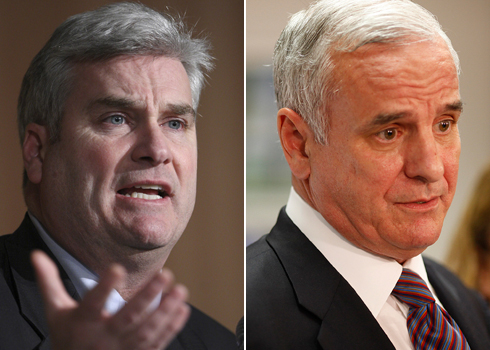The Minnesota gubernatorial race has now seen its first piece of key litigation before the state Supreme Court, with the panel having just heard arguments this afternoon on Republican nominee Tom Emmer’s efforts to force counties to potentially remove ballots from the total vote count.
The subject may seem dry, but it could have a real consequence: If the court sides with Emmer, it could potentially delay the recount, which is otherwise supposed to begin on November 29. And what’s more, a delay in the recount procedures could have the effect of delaying the seating of a new governor, likely keeping Republican Gov. Tim Pawlenty in office in the interim. The State Canvassing Board is scheduled hold a key meeting tomorrow, at which it would order the recount to proceed.
Here is the quick overview: Minnesota law provides for, if a precinct is found to have an excessive number of votes beyond the number of people who are recorded as having voted there, to randomly remove votes from the tallies. The big questions, then, are how to properly determine what the right number is, and whether any true over-voting occurred.
Team Emmer argues that the law can only allow for the people who signed the register to be the proper measurement, while the Secretary of State’s rules (which go back to the 1980s) have directed precinct workers to count up the number of separate voter receipts.
No ruling was immediately made. If experience from the last statewide recount is a guide (which is not a guarantee), then a ruling for a pressing recount matter such as this one could potentially occur within the next few days.
As we’ve previously covered, a key weedy issue here is that Team Emmer’s legal briefs referred to “election certificates” from the state statute — which have not existed for years. In their place, regulations from the Secretary of State’s office have guided local election workers to use the receipts.
At one point, Chief Justice Lorie Skjerven Gildea asked Emmer attorney Diane Bratvold whether their case would collapse if the court found the state’s regulation to be valid. At first Bratvold said she couldn’t event speculate on an obviously invalid rule.
Justice Alan Page then asked: “Humor us.”
Bratvold conceded that the case would not work if the state’s regulation were found to be valid.
Meanwhile, the Secretary of State office’s attorney Alan Gilbert and Democratic nominee Mark Dayton’s attorney Marc Elias both argued that the Emmer suit against the rule was invalid — that it was too late under the doctrine of laches, that a claim can become invalid to a failure to act on it at the correct time.
Elias referenced past election case laws, including the infamous eight-month Minnesota Senate recount in which he was an attorney just two years ago. “All of them stand for the same proposition that once all the ballots are opened, and once you know the vote totals, courts should be skeptical about the procedural challenges that could be brought forward,” said Elias.”The time to bring a challenge to the process is before the election,” said Elias, saying that the time before any votes have been cast removes any presumptions about how a rule would help one candidate or another.
In addition, Gilbert argued that the number of apparent “overage” votes was very small — only about 30 in the state’s two most populous counties, he said. He and Elias both argued that minimal errors could be “de minimis,” that local officials could find them to be validly-cast ballots, and Elias argued that votes need not be discarded where election workers could provide explanations for seeming errors.
Gilbert’s point is potentially important, because Dayton’s current margin over Emmer is 8,755 votes — a margin that many people think is too wide to overcome even if certain irregularities and errors might be found.
Bratvold held firm to her position, in her final Q&A with the justices: “The integrity of the voting process requires that votes not be diluted…No extra impermissible ballots should be included, and the petition should be granted.”
(Special thanks to The UpTake for providing a video stream.)









